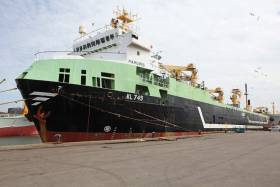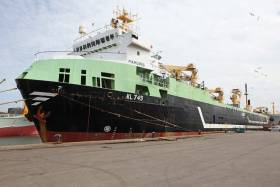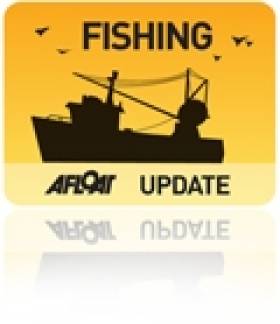Displaying items by tag: FV Margiris
Fishers in Ireland and conservation groups are keeping a close eye on the supertrawler Margiris, which is currently fishing off Ireland’s West Coast.
According to GalwayBeo, the controversial factory ship has been labelled a “vacuum cleaner of the sea” for its ability to catch and freeze as much as 250 tonnes of fish every day.
It’s also been implicated in discarding huge quantities of bycatch — a practice banned in the European Union.
But the Dutch company that operates the vessel claims its fishing methods are less damaging to the marine environment than regular trawling and that it has “excellent reputation for sustainable fishing”.
GalwayBeo has more on the story HERE.
Controversial Supertrawler Tracked Off Mayo Coast After Shedding More Than 100,000 Dead Fish in French Waters
A supertrawler implicated in the discarding of more 100,000 dead fish off the coast of France has been tracked to waters off Co Mayo, as Independent.ie reports.
Maritime campaigners filmed the release of blue whiting from the FV Margiris in the Bay of Biscay earlier this month — an incident the trawler’s owner said was “involuntary”, blaming a ruptured net.
But environmental activists Sea Shepherd claim the incident is an example of discarding bycatch, a practice explicitly banned in the European Union.
The FV Margiris, which was previously barred from fishing in Australia, has sparked controversy in Irish waters before.
In December 2016 the world’s second-largest factory-freezer vessel was boarded off the North West coast by Naval Service personnel following concerns among the trawler fleet fishing out of Killybegs.
Independent.ie has more on the current story HERE.
Supertrawler Boarded For Inspection Off Donegal
#Supertrawler - Naval Service personnel from the LÉ James Joyce have boarded a controversial fishing ‘supertrawler’ off the North West coast, according to the Donegal Democrat.
As previously reported on Afloat.ie, the 9,500-tonne FV Margiris — one of the largest fishing vessels in the world — prompted renewed fears among local fisherman and conservationists last week when it was spotted in fishing grounds off Donegal.
News of the Naval Service inspection has been welcomed by the Irish Wildlife Trust, though it cautioned on the need for a full-time inspection regime for such large-scale factory trawlers to ensure they are fishing legally and within quota, and not causing harm to protected wildlife such as dolphins.
The Donegal Democrat has more on the story HERE.
Supertrawler ‘Margiris’ Returns To Fish In Irish Waters
#Supertrawler - The controversial supertrawler Margiris has returned to fish in Irish waters, as Coast Monkey reports.
Previously banned from Australian waters, the 9,500-tonne FV Margiris is one of the largest fishing trawlers on the seas, and has previously fished off Ireland with a quota under the Common Fisheries Policy.
That hasn’t assuaged concerns among the Irish fishing fleet, nor conservationists who fear a connection between the activities of large-scale ‘floating factory’ type fishing vessels and rising numbers of dolphin strandings in the North West.
This past September, MEP Sean Kelly called for regular on-board inspections of supertrawlers fishing in Irish waters to ensure they are sticking to CFP regulations.
The FV Margiris’s latest position can be tracked via Marine Traffic HERE.
Supertrawlers Leave Irish Waters Before Inspectors Can Board
#Fishing - Two supertrawlers feared to have been "pillaging" fishing grounds off the West Coast have left Irish waters before the Naval Service could board them for inspection.
According to The Irish Times, poor weather conditions over the past fortnight deterred inspection of the Margiris – which has been banned from Australian waters – and the Annelies Ilena, formerly the Atlantic Dawn, whose skipper was convicted after the vessel was detained for breaching EU regulations earlier this year.
The same trawler was detained two years ago over similar alleged infringements, as previously reported on Afloat.ie.
Both supertrawlers were declared as "high priority" inspection targets due to their large size and on-board fish processing facilities and were being monitored by both the Naval Service and the Sea Fisheries Protection Agency, the latter of which noted the "specific challenges" of closer observation at sea.
MEP Luke 'Ming' Flanagan is among those calling for a stricter inspection regime for such vessels that includes a mandatory stop at an Irish port before leaving this country's waters.
The Irish Times has much more on the story HERE.
Supertrawler In Irish Waters 'Needs Independent Observer'
#Fishing - Wildlife conservationists have called for an independent observer to be placed aboard a supertrawler previously banned from Australian waters that's returned to Ireland's fishing grounds.
According to The Irish Times, the Irish Wildlife Trust (IWT) has urged Marine Minister Simon Coveney to ensure that the FV Margiris – one of the world's largest fishing boats – is sticking to its quota under the Common Fisheries Policy (CFP) as it fishes off Donegal.
The biggest concern for conservationists is possible by-catch in waters that double as a protected cetacean sanctuary by the 143m vessel, which trawls with enormous nets said be bigger than a football pitch, as the Belfast Telegraph reports.
"It is simply unacceptable that enormous boats like this can move into our waters and hoover up marine life," said IWT campaigns officer Padraic Fogerty.
His concerns were echoed by Irish Fish Producers Organisation (IFPO) CEO Francis O'Donnell, who said that while the boat may be fishing on licence with a quota, "the real worry I would have is that they are not being controlled properly by Irish authorities in Irish waters."
Last year Minister Coveney was forced to assuage concern over the Margiris' fishing activity off the west coast as it has secured an allocation for blue whiting under the CFP.
In other fishing news, The Irish Times says Minister Coveney has promised weekly meetings by the new cross-departmental taskforce established to investigate claims of exploitation in the Irish fishing fleet.
Inspections of fishing vessels began last week, resulting in one Egypptain fisherman charged, but ahead of the latest meeting the minister said: "I don’t want this to be a witchhunt on people who may be here illegally and may be vulnerable."
As previously reported on Afloat.ie, the first meeting of the taskforce took place last Thursday 5 November in the wake of a damning Guardian report alleging the exploitation of undocumented and even trafficked labour in the Irish fishing industry.
The allegations have been criticised by leading industry figures as well as the daughter of the lake skipper of the Tit Bonhomme, which sank tragically in January 2012 taking the lives of three Egyptian fishermen along with her father and a fellow Irish crewman.
Minister Assuages Concerns Over Visiting Supertrawler
#Fishing - A supertrawler previously expelled from Australian waters that has appeared off the west coast is nothing to be worried about, Marine Minister Simon Coveney said at the weekend.
According to The Irish Times, Minister Coveney told concerned fishermen in Galway that the 9,500-tonne FV Margiris, one of the largest fishing trawlers on the seas, is "probably" involved in legitimate fishing after securing an allocation for blue whiting under the Common Fisheries Policy.
He also admitted that the Naval Service had not inspected the vessel to confirm it is abiding by the rules, but that "we take note" of any such super-sized vessels that come into or near Irish waters.
The minister was speaking at the Galway Skipper Expo, the annual international fisheries show that was celebrating its 10th anniversary last weekend.
































































